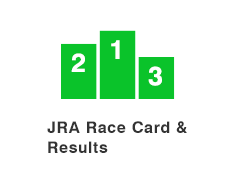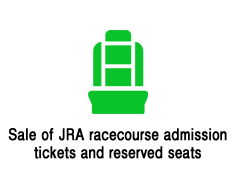NHK Mile Cup (G1) - Data Analysis
Three-year-old mile champion decider
Established in 1996, the NHK Mile Cup is the race that decides the three-year-old mile champion. It brings together not only runners that have consistently entered short-distance races since their debut race, but also runners that have shifted focus from the classic races trajectory, resulting in a tumultuous contest each year. Let’s now look for some trends in this race based on results over the last 10 years.
Runners with G1 experience have an edge
Looking at performances by runners over the last 10 years in terms of their previous race, we find that runners that had previously contested a G1 race enjoyed the highest Top 3 ratio. Among runners coming from a G2 or G3 race, Umbrail finished as runner-up in 2023 (previous race: New Zealand Trophy; entered Hanshin Juvenile Fillies as two-year-old) and Danon Scorpion won the race in 2022 (previous race: Arlington Cup; entered Asahi Hai Futurity Stakes as two-year old). This suggests we should raise our expectations of runners in this group that have experience of contesting a G1 race as a two-year-old. [Table 1]
[Table 1] Performance by previous race (last 10 years)
| Previous race |
Performance
[1st-2nd-3rd-4th or lower] |
Win ratio |
Top 2 ratio |
Top 3 ratio |
| G1 |
4-3-1-25 |
12.1% |
21.2% |
24.2% |
| G2 |
3-2-3-53 |
4.9% |
8.2% |
13.1% |
| G3 |
3-3-6-53 |
4.6% |
9.2% |
18.5% |
| Open-class |
0-2-0-12 |
0% |
14.3% |
14.3% |
| 1-win class |
0-0-0-4 |
0% |
0% |
0% |
| Maiden |
0-0-0-1 |
0% |
0% |
0% |
| Overseas race |
0-0-0-1 |
0% |
0% |
0% |
Watch runners with 4 previous wins
Over the last 10 years, runners with 4 previous wins in JRA races achieved a Win ratio of 50.0%. If a runner with such a profile enters the race, we should raise our expectations accordingly. Runners with 3 and 2 wins achieved roughly comparable success ratios, so there is no need to differentiate between them in our evaluation. The only runner to triumph in the NHK Mile Cup with only 1 previous win on her record was Aerolithe in 2017, but she had also finished as runner-up in two graded races and secured 5th place in the Oka Sho (Japanese 1000 Guineas). In other words, we should lower our expectations of runners with only 1 previous win and an otherwise unremarkable record. [Table 2]
[Table 2] Performance by number of wins in JRA races (last 10 years)
| Number of wins in JRA races |
Performance
[1st-2nd-3rd-4th or lower] |
Win ratio |
Top 2 ratio |
Top 3 ratio |
| 4 |
3-0-0-3 |
50.0% |
50.0% |
50.0% |
| 3 |
2-3-2-39 |
4.3% |
10.9% |
15.2% |
| 2 |
4-7-6-80 |
4.1% |
11.3% |
17.5% |
| 1 |
1-0-2-27 |
3.3% |
3.3% |
10.0% |
Runners coming from races with a shorter distance struggle
Looking at performances by runners over the last 10 years in terms of the distance of their previous race, we find many examples of strong performances by runners that had also contested a 1,600m race in their previous race. However, runners coming from a 2,000m race achieved high success ratios. Runners that had previously contested a race with a distance of 1,800m did not produce any winners, but their Top 3 ratio was not different from those coming from a 1,600m race. Meanwhile, runners that had contested a race with a distance of 1,400m or less last time out had lower success ratios. [Table 3]
[Table 3] Performance by distance of previous race (last 10 years)
| Distance of previous race |
Performance
[1st-2nd-3rd-4th or lower] |
Win ratio |
Top 2 ratio |
Top 3 ratio |
| 1,200m |
0-0-0-1 |
0% |
0% |
0% |
| 1,400m |
1-1-1-31 |
2.9% |
5.9% |
8.8% |
| 1,600m |
6-5-7-87 |
5.7% |
10.5% |
17.1% |
| 1,800m |
0-3-1-19 |
0% |
13.0% |
17.4% |
| 2,000m |
3-1-1-11 |
18.8% |
25.0% |
31.3% |
Focus on runners sired by Daiwa Major
The sire to watch for the NHK Mile Cup is Daiwa Major, who not only produced two winners over the last 10 years, but also one winner prior to that, which is proof of a strong affinity with this race. In particular, runners sired by Daiwa Major backed as 3rd favorite or higher have delivered stable performance of [2-2-0-1]. In addition, foreign-bred runners had a Top 3 ratio of 30%. In other words, if overseas horses participate in the race, we should consider them in our selection. [Table 4]
[Table 4] Performance by major sire (last 10 years)
| Sire |
Performance
[1st-2nd-3rd-4th or lower] |
Win ratio |
Top 2 ratio |
Top 3 ratio |
| Daiwa Major |
2-2-1-6 |
18.2% |
36.4% |
45.5% |
| Lord Kanaloa |
1-2-0-13 |
6.3% |
18.8% |
18.8% |
| Real Impact |
1-0-0-1 |
50.0% |
50.0% |
50.0% |
| Duramente |
1-0-0-1 |
50.0% |
50.0% |
50.0% |
| Kingman |
1-0-0-0 |
100% |
100% |
100% |
| Matsurida Gogh |
0-1-0-4 |
0% |
20.0% |
20.0% |
| Kizuna |
0-1-0-1 |
0% |
50.0% |
50.0% |
| Speightstown |
0-1-0-0 |
0% |
100% |
100% |
| Orfevre |
0-0-1-2 |
0% |
0% |
33.3% |
| Heart’s Cry |
0-0-1-1 |
0% |
0% |
50.0% |
Note: Only includes sires with three-year-old offspring that are active in JRA races.
Seek out the winner!
Check horse number, grade of previous race, and finish in previous race
Since 2017, all winners have started the race from brackets 11 or above. In addition, the last 10 winners had all finished in the Top 3 in a G2 or G3 race or in the Top 5 of G1 race last time out. In other words, we should search for potential winners from runners entering the race with the number 10 or above that chased the top places in a graded race last time out. [Table 5]
[Table 5] Winners’ number and finish in previous race (last 10 years)
| Year |
Winner |
Horse number |
Previous race |
Finish in previous race |
| 2014 |
Mikki Isle |
10 |
Arlington Cup (G3) |
1st |
| 2015 |
Clarity Sky |
7 |
Satsuki Sho (Japanese 2000 Guineas) (G1) |
5th |
| 2016 |
Major Emblem |
4 |
Oka Sho (Japanese 1000 Guineas) (G1) |
4th |
| 2017 |
Aerolithe |
16 |
Oka Sho (Japanese 1000 Guineas) (G1) |
5th |
| 2018 |
Keiai Nautique |
11 |
New Zealand Trophy (G2) |
2nd |
| 2019 |
Admire Mars |
17 |
Satsuki Sho (Japanese 2000 Guineas) (G1) |
4th |
| 2020 |
Lauda Sion |
11 |
Chunichi Sports Sho Falcon Stakes (G3) |
2nd |
| 2021 |
Schnell Meister |
15 |
Hochi Hai Yayoi Sho (Deep Impact Kinen) (Japanese 2000 Guineas Trial) (G2) |
2nd |
| 2022 |
Danon Scorpion |
18 |
Arlington Cup (G3) |
1st |
| 2023 |
Champagne Color |
11 |
New Zealand Trophy (G2) |
3rd |
(Yodohito Himezono)
|

- Preview
- Barrier draw
- Past performances of runners

- News
- Race result
- Video
- 2025 English

- 2024 English

- 2023 English

- 2022 English

- 2021 English

- 2020 English

- 2019 English

- 2018 English

- 2017 English

- 2016 English

- 2015 English

- 2014 English

- 2013 English

- Photo Gallery
2025 Winner: Panja Tower
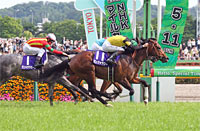
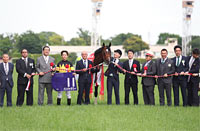
2024 Winner: Jantar Mantar
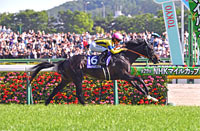
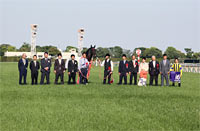
|






